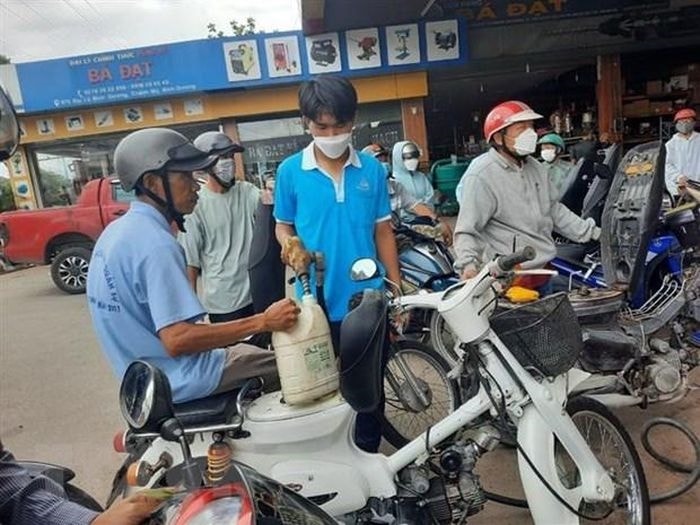The Ministry of Industry and Trade affirmed that it will only handle the sale of gasoline through mini pumps, hand-shaken pumps, barrels, cans, bottles and other containers, but not the purchase of gasoline in cans or bottles.

People carry cans to buy gasoline
Recently, on social networks, there has been some information that is commentary, speculation, and lacks a correct understanding of the legal regulations regarding the act of selling gasoline using mini pumps, hand-shaken pumps, barrels, cans, bottles, and other containers.
According to the Ministry of Industry and Trade, the Minister of Industry and Trade issued Directive No. 09/CT-BCT dated November 4, 2022 directing market management forces nationwide to coordinate with local authorities, including the following content: "Promptly detect, prevent and strictly handle violations according to the provisions of law on petroleum trading activities, especially acts of hoarding, creating scarcity of petroleum supply; acts of selling petroleum with mini pumps, hand-shake pumps, barrels, cans, bottles and other containers, except for cases where traders are business households, petroleum stations of the armed forces in mountainous areas, highlands according to the provisions of law have been permitted by the People's Committees of provinces and cities to act as retail agents of petroleum with a scale and equipment suitable to the petroleum trading conditions in that area..."
The Ministry of Industry and Trade affirmed that the direction of the Ministry of Industry and Trade is necessary and in accordance with the provisions of Article 35, Decree No. 99/2020/ND-CP of the Government regulating administrative sanctions for violations in the field of petroleum, petroleum and gas trading to ensure stability of the domestic petroleum market, avoid speculation, profiteering, illegal sales, potential risks of fire and explosion safety...
Currently, the law does not prohibit consumers from buying gasoline in bottles or cans to take home. Because gasoline is not only used for transportation such as cars, motorbikes, etc. Many small businesses can use it to run engines such as operating milling machines at home, running boats and canoes in river areas, and many other types of engines.
However, petroleum is a special commodity and a conditional business, so petroleum trading must comply with the provisions of law, must be registered with the state management agency and licensed.
On the other hand, those who trade and transport gasoline must comply with many regulations on storage, fire prevention and fighting, quality, and staff; the law strictly prohibits hoarding, speculating, and illegally reselling gasoline for profit.
Article 35 of Decree 99/2020/ND-CP of the Government on administrative sanctions for violations in the petroleum sector, effective from October 11, 2020, stipulates the fine for violations of other regulations on retailing gasoline as follows: "A fine of VND 3 million to VND 5 million shall be imposed for the act of selling gasoline through mini pumps, hand-shake pumps, barrels, cans and other containers, except for traders who are business households, gasoline stations of the armed forces (national defense, police) in mountainous areas and highlands according to the provisions of law, permitted by the People's Committee of the province or centrally-run city to act as gasoline retail agents with a scale and equipment suitable to the gasoline business conditions in that area."
With this regulation, many people mistakenly believe that buying gasoline in barrels, cans, or bottles is prohibited. However, this regulation only applies to gas stations (petrol traders).
On the other hand, Article 35 takes into account specific factors when it clearly stipulates: "Except for traders who are business households, petrol stations belonging to the armed forces (national defense, police) in mountainous areas and highlands according to the provisions of law are permitted by the People's Committees of provinces and centrally-run cities to act as petrol retail agents with a scale and equipment suitable to the conditions of petrol business in that area."
The reason for this regulation is because selling goods through cans, barrels, and mini gas cylinders often does not ensure fire safety, and does not comply with the standards required by law for gasoline trading - a conditional business item.
In addition, storing gasoline and oil cannot cause fire or explosion if safety is not ensured. According to the Law on Fire Prevention and Fighting 2001 (amended in 2013), the illegal production, storage, transportation, use, and trading of flammable and explosive substances is strictly prohibited and may result in administrative penalties or criminal prosecution.
The directive document of the Ministry of Industry and Trade clearly stated that it only handles the act of selling gasoline through mini pumps, hand-shaken pumps, barrels, cans, bottles and other containers, but not the act of buying gasoline through cans, bottles, barrels and other containers.
According to the Ministry of Industry and Trade, Clause 4, Article 32 of Decree 144/2021/ND-CP clearly stipulates: A fine of 15 million to 25 million VND shall be imposed on individuals who illegally store dangerous substances and goods that are flammable or explosive.
For organizations committing the same violation, the fine is twice the fine for individuals. (Clause 2, Article 4, Decree 144/2021/ND-CP). The act of storing gasoline can be held responsible for the crime of "Violating regulations on fire prevention and fighting" according to the provisions of Article 313 of the Penal Code 2015 (amended and supplemented in 2017).
Recently, the Ministry of Industry and Trade has also sent official dispatches to a number of ministries, branches and units including the Ministry of Public Security, the Ministry of Finance, the Ministry of Transport, the Vietnam National Oil and Gas Group, Nghi Son Refinery and Petrochemical Limited Liability Companies, Binh Son and the People's Committees of provinces and cities, requesting to strengthen support measures to ensure the supply of gasoline and oil for the domestic market.
According to VNA